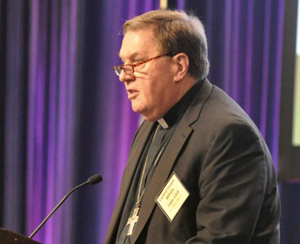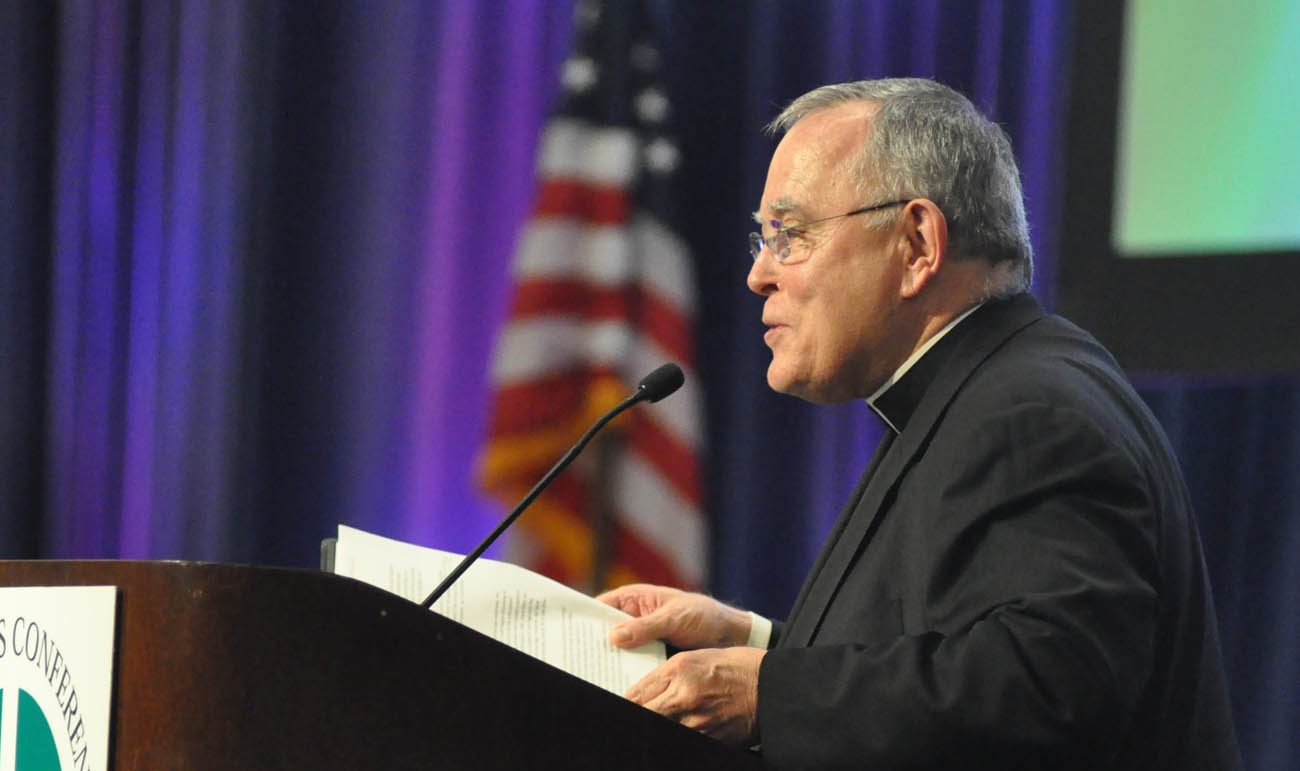INDIANAPOLIS (CNS) — At a time when an estimated 50 percent of Catholics 30 and younger no longer identify with their religion, the U.S. bishops June 14 discussed the need to reverse that trend and why the consultation process for the October 2018 Synod of Bishops on youth and vocations is crucial to that effort.
On the first day of the bishops’ spring meeting in Indianapolis, Cardinal Joseph W. Tobin of Newark, New Jersey, and Archbishop Charles J. Chaput of Philadelphia opened the discussion with a presentation on the consultations and questions for the bishops to consider in preparing for the synod.
“The synod indeed comes at a critical time,” Cardinal Tobin told his fellow bishops in his opening remarks. “We know that there are both challenges and opportunities here in the U.S. The increased amount of disconnected millennials is certainly a concern for us, as is the decline and the delay of marriage among young people. Still there are various positive signs to build upon.”
[hotblock]
Those signs, he said, include “the high interest among millennials during the liturgical seasons of Advent and Lent” and “the continued importance in our ministries and outreach to young people which have a positive effect on vocational discernment.”
“The church in the U.S. is poised to engage this conversation for and with young people,” he added.
Listening to young people is essential to the conversation, Cardinal Tobin noted.
“This is a time to learn from youth and young adults, to listen to their stories and to engage them in authentic dialogue,” he said. “We can also remember that youth and young adults are the agents, not the objects, of this process and of this synod. So they must have as much at stake in this as we do.
“Further, we can involve leaders in youth, campus and young adult ministries, vocations, marriage and family life — all who connect with youth and young adults in their work.”
Archbishop Chaput announced that a Vatican web survey has now been launched for youth and young adults in preparation for the synod: http://youth.synod2018.va.
He then shared two main questions for bishops to consider:

Cardinal Joseph W. Tobin of Newark, N.J., speaks June 14 of the opening day of the U.S. Conference of Catholic Bishops’ annual spring assembly in Indianapolis. (CNS photo/Sean Gallagher, The Criterion)
— How can bishops most effectively accompany youth and young adults in their baptismal call to missionary discipleship and in their vocational discernment — whether marriage, ordained ministry or consecrated life?
— How is The U.S. Catholic Church listening to youth and young adults, and what are the best practices in the ministry of accompaniment that are worth sharing with the universal church at the synod?
The number of bishops who wanted to respond publicly went beyond the allotted time in the morning session and continued into the afternoon session.
Archbishop Timothy P. Broglio shared his insights as head of the U.S. Archdiocese of the Military Services, noting what he has learned from young adults serving their country.
“Young people are not particularly opposed to the practice of their faith, but it is very important to invite them and preferably that they be invited by their peers,” Archbishop Broglio said. “We have to find ways to extend the invitation to living the faith — and also animating those people who do participate in the life of faith to bring their fellows with them.”
Archbishop Joseph E. Kurtz of Louisville, Kentucky, encouraged his fellow bishops to “buy in” to listening to young people.
“Mutually, we all should be buying into a vision of church,” Archbishop Kurtz said.
[hotblock2]
That approach was also emphasized — and extended — Auxiliary Bishop Fernand J. Cheri III of New Orleans.
“Young people have an enthusiasm that is just crazy, and you got to let that craziness take you where it’s going to take you,” Bishop Cheri said. “I hope and pray we’re open to receive that as we work with young people and make room for them in our Church. The vocations we want to achieve and make real for them will come alive if we allow them to creatively discover the journey to that.”
Archbishop Joseph F. Naumann of Kansas City, Kansas, shared some of the challenges of young adults that he has learned from conversations he has had with them.
“Some at least have this insight of experiencing this tremendous apparent freedom they have, that is actually another form of enslavement — this freedom from moral norms,” Archbishop Naumann noted. “They were actually seen as something that paralyzes them.”
As part of their increased efforts to connect the Catholic faith to young people, bishops also should keep in mind — and reach out to — members of this generation whose lives are affected by racism, immigration and incarceration, said Bishop Jaime Soto of Sacramento, California.
“The topics of the synod are very relevant to many of the youths who find themselves in the uncertainty of their own immigration status or that of their parents or family members — and who are looking for hope,” Bishop Soto said.
Auxiliary Bishop Robert E. Barron of Los Angeles shared his insights from his knowledge of a significant part of this young age group, a segment known as “nones” — because they don’t identify with any particular religion.
“The statistics as we all know are pretty troubling,” said Bishop Barron. “One of them is that of Catholics 30 and younger, fully 50 percent identify as ‘nones.’ And when you ask them their objections, they’re often intellectual problems dealing with God, dealing with religion and violence, and especially religion and science.
“What strikes me as a danger is if we come at our young people with language of ‘baptismal call,’ ‘vocational discernment,’ ‘missionary discipleship.’ For a lot of our young people, that’s just opaque language. We have to clear the ground in a significant way by what I think is a new apologetics,” he said.
[hotblock3]
“I hope that maybe as we approach this synod we can think through this issue of addressing some of these real intellectual difficulties young people have, before we can plant the seed of effective evangelization,” he added.
The conversation about young people and faith among the bishops started after a presentation by John Cavadini, a theology professor from the University of Notre Dame.
Cavadini, who also is director of the university’s Institute for Church Life, shared a talk with the bishops that he called, “The Baptismal Vocation in the Light of Vocational Discernment of Young People.”
“Apart from the problem of evil, perhaps the hardest thing for young people to negotiate is the church itself,” Cavadini noted. “Why the church? Why is it worth belonging? What’s the point of that vocation? Aren’t there other ways to become exclamation points for goodness? Can’t I just be a good person?'”
Cavadini stressed that by virtue of baptism people are called to something deeper in their lives — a connection to Christ, the Eucharist and the Catholic Church.
“The person baptized no longer belongs to him or herself, but to him who died and rose for us,” Cavadini told the bishops. “Baptism configures us to the paschal mystery of Christ’s passion, death and resurrection. Our being has an essential and irreducible reference to that mystery.”
That connection makes all the difference for all people, including the young, he said.
“The discussion of vocation and of the baptismal vocation is incomplete, misleading and ultimately impossible the more distant it becomes from a proper sense of the mystery of the church into which baptism indelibly fixes us,” he said. “To be a baptized Christian means to be awesomely aware of this mystery in one’s own person and thus to find oneself called further.
“The closer you get to the wounds of Christ — the result of his baptismal solidarity with sinners — the closer you get to everyone.”
***
Shaughnessy is assistant editor of The Criterion, newspaper of the Archdiocese of Indianapolis.
PREVIOUS: Gregory: Bishops ‘can never say we are sorry enough’ for tragedy of abuse
NEXT: Holy Cross priest presents reflection on immigration issues for bishops




Whatever ANYONE does (or tries to do), the PARENTS of our young have to be reached. More occasions of Baptisms during Mass would mean that more people would hear them being called the first teachers of their children.